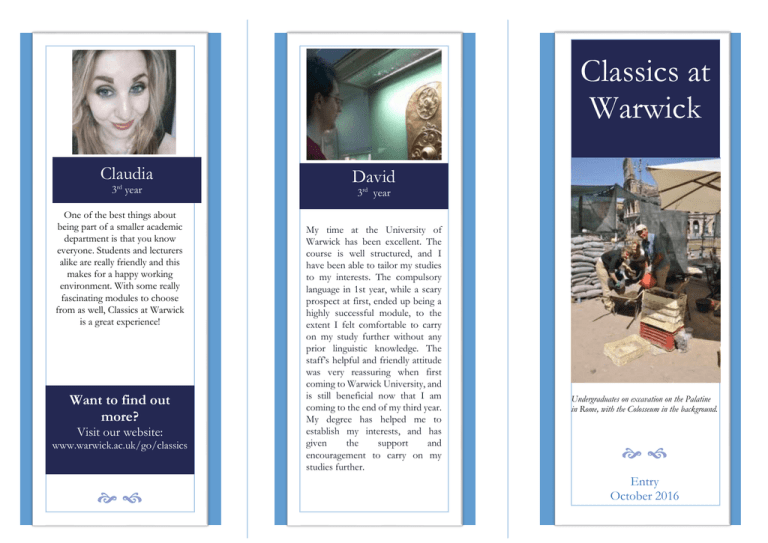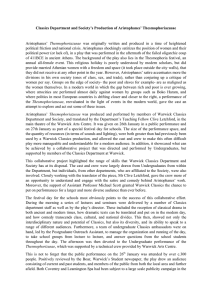Classics at Warwick Claudia David
advertisement

Classics at Warwick Claudia rd 3 year One of the best things about being part of a smaller academic department is that you know everyone. Students and lecturers alike are really friendly and this makes for a happy working environment. With some really fascinating modules to choose from as well, Classics at Warwick is a great experience! Want to find out more? Visit our website: www.warwick.ac.uk/go/classics David 3rd year My time at the University of Warwick has been excellent. The course is well structured, and I have been able to tailor my studies to my interests. The compulsory language in 1st year, while a scary prospect at first, ended up being a highly successful module, to the extent I felt comfortable to carry on my study further without any prior linguistic knowledge. The staff’s helpful and friendly attitude was very reassuring when first coming to Warwick University, and is still beneficial now that I am coming to the end of my third year. My degree has helped me to establish my interests, and has given the support and encouragement to carry on my studies further. Undergraduates on excavation on the Palatine in Rome, with the Colosseum in the background. Entry October 2016 Recent books by our academics Manual of Latin Epigraphy – Alison Cooley Res Gestae Divi Augusti – Alison Cooley The Greeks and Greek Love – James Davidson Why Classics at Warwick? What is different about studying classics at Warwick? Research-led teaching by leaders in the field The first year is a general introduction to the main areas of the subject. In the following years you can choose from a wide variety of subjects taught by those who are involved in cutting edge research in the field. Size of Department With around 80 undergraduates each year, you can get to know the others in your year group, since you are taught the core modules together. It also means there is a strong staff to student ratio, and you will have a great deal of contact with us, as teachers and personal tutors. Interdisciplinary, innovative and flexible teaching Our philosophy is to take a broad approach when studying a topic, bringing in a variety of sources and going beyond the traditional confines of the discipline. Thanks to the Institute of Advanced Teaching and Learning at Warwick (IATL) our classes also often go beyond the traditional lecture theatre setting. Feedback on work Our students get detailed feedback on each assessed essay, making it clear how it received the mark and how to improve in the next assessment. Advantages of a campus-based university You get to know people well if they are not dispersed across a city, both in Classics and from other subjects. Archaeology and Exchange placements We have placed people on excavations in Italy and encourage those with an interest to get their trowel out! We have exchange agreements with universities in Italy as well as Monash University in Australia. Student-staff collaboration Students and staff work together on research, engagement and outreach projects, including the annual play. Aegina: Contexts for Choral Lyric Poetry, Myth, History and Identity in the Fifth Century BC – ed. David Fearn The role of Latin in the early modern world – Andrew Laird Imperious Passions: Greek Love, Empire and Orientalism at the Fin de Siecle – Dan Orrells Under Divine Auspices: Divine Ideology and the Visualisation of Imperial Power in the Severan Period – Clare Rowan Economy, family, and society from Rome to Islam: a critical edition, English translation, and study of Bryson's "Management of the Estate" – Simon Swain Energetic Classics Society Toga parties, nights out, annual play for the thespians. Delphi. Centre of the Ancient World – Michael Scott And after! Warwick University is a top target for major UK recruiters. Six months after graduating 94.3% of 2013 Warwick Classics students were in jobs or further study. Medicine: Antiquity and its Legacy - Caroline Petite. Coinage in Roman Syria – Kevin Butcher



